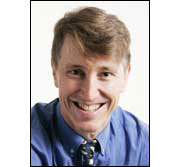As she may be our next president, it is germane to now ask: Has Park Geun-hye had charisma-bypass surgery?
If you have not noticed, it is election season. Hence, we members of the foreign press corps are privileged to meet the candidates at press conferences.
What normally happens at these events is this: You, the hack, enter the venue, pick up a copy of the speech and take a seat among your colleagues. The great one is ushered in, amid a mighty crowd of aides and hangers-on. The candidate then sits at the head table and reads his/her speech. This usually takes half an hour, during which you and your colleagues twiddle thumbs, scratch backsides and covertly peruse cell phones.
You all wonder the same thing: Why is this person droning away? We can read! Why not just give us a prepared statement and dispense with the speechifying? Eventually, the speaker finishes and the real action, the cut-and-thrust of Q&A, begins.
This is good fun, and some politicos play ball. Moon Jae-in – to his credit – took all questions and answered most. (Rather than simply ignoring questions and reiterating his key messages, a lame PR trick). And he leveraged his personality, coming round and pressing the flesh of every journo in the room.
Not so Park. Known as the “Ice Princess” for good reason; she had limited time and appeared keen to move on to her next appointment.
Worryingly, even members of her entourage seem to lack faith in her communicative abilities. At one point, an academic advisor leapt up, grabbed the microphone and explained what “Madame Park” had meant to say, which apparently the interpreter had not correctly conveyed. (Park herself looked only slightly bemused at this unorthodox intervention, indicating that it was not the first time.)
I have met Park on several occasions over the years, and while she is pleasant, I sense little charisma, that force of personality leaders exude. (For example, her father famously finished a speech at the event at which his wife had just been shot.)
Yet Park’s presentation skills are pretty standard for local politicians and bureaucrats. This is puzzling, as Korea is a democracy. Formulating policies is just part of a politician’s job; equally (arguably more) important is persuading voters. This requires communication skills – skills most speakers apparently lack.
Firstly, their presentations feature little juicy word play and few (if any) memorable sound bytes. Of course, there is a language barrier. In the vernacular, their speeches probably sound better. Even so, their content tends to be vague, lacking supportive detail or empirical foundation.
Moreover, communication is not simply lexical. There are two key drivers of human behavior: rationality and emotion. But oddly – given how hot-blooded Koreans are – very few speakers are emotionally engaging.
Kim Dae-jung was a masterly rabble rouser at the podium but less inspirational when meeting foreign reporters. Ban Ki-moon was notoriously evasive and dull as a briefer – a reputation which followed him to the UN. In the corporate field, power speakers do not exist: Korean chairmen don’t lower themselves to delivering public presentations.
So what are the keys to compelling speaking?
The 20th century’s great orators all had specialties. Winston Churchill was a master of the English language with a fast (often witty), response, honed in parliamentary debate. Martin Luther-King, too, was a master wordsmith, particularly in his emotive use of repetition for effect. Adolf Hitler combined operatic delivery with theatrical performance, backed by masterly stage management.
All had the ability to move listeners and inspire them, for good or ill. Had any of them presented to the Seoul Foreign Correspondents Club, I doubt if they would have parked their bums and read out a long yawner of a speech.
This issue of sub-par communication skills is recognized elsewhere in the region. Recent reports state that China’s Communist Party has banned “dull, long speeches.” Good! So what improvements might be necessary?
First, hire a competent speech writer who can lay out big ideas using emotive language but who backs these ideas with detail and data.
Dispense with full speeches and work from cues. If reading line-by-line, you lose eye contact with your audience.
Modulate tone and tempo, using the “power pause” to underscore core points. (U.S. presidents are masters of this).
Animate your delivery with body language. (Hitler used to film his gesticulations to ensure his performances were down pat.)
Work with visual aids rather than sheets of paper: PowerPoint; flip charts or real objects. (Steve Jobs provides a benchmark.)
Don’t sit. Stand behind a lectern or ― even better ― pace your stage.
And don’t make the mistake of handing out your presentation in advance. If you do this, the audience switches off and reads it themselves.
In the unlikely event of Ms Park reading this, I would say don’t despair: These skills can be learned, trained and honed.
If you win the Blue House, you don’t want to benchmark Kim Jong-il, who ruled for decades from behind closed doors and who only ever made a single utterance to his adoring public or those corporate chairmen who are never seen in public, do you?
Hmmm, now I think about it: Those leaders enjoyed remarkable longevity. Damn! Ignore everything I just wrote.
Carry on, Ms Park, carry on…
Andrew Salmon is a Seoul-based reporter and author. Reach him at andrewcsalmon@yahoo.co.uk. <The Korea Times/Andrew Salmon>



